Analyzing Cultural Challenges in International Management for Business
VerifiedAdded on 2020/11/12
|6
|1158
|301
Report
AI Summary
This report delves into the critical challenges posed by cultural differences within multinational companies, specifically focusing on their impact on Global Financial Services. The analysis highlights key areas where cultural disparities can affect business operations, including communication barriers arising from language and cultural nuances, workplace etiquette differences in formality and communication styles, and varying organizational hierarchies and management approaches. The report also examines the influence of differing workplace values, such as power distance, individualism versus collectivism, and attitudes toward time management. It emphasizes the need for strategies to overcome these challenges, such as implementing inclusive employee policies, fostering adaptable organizational structures, and providing comprehensive employee training. By addressing these cultural issues, Global Financial Services can effectively expand into new markets and enhance overall business performance.
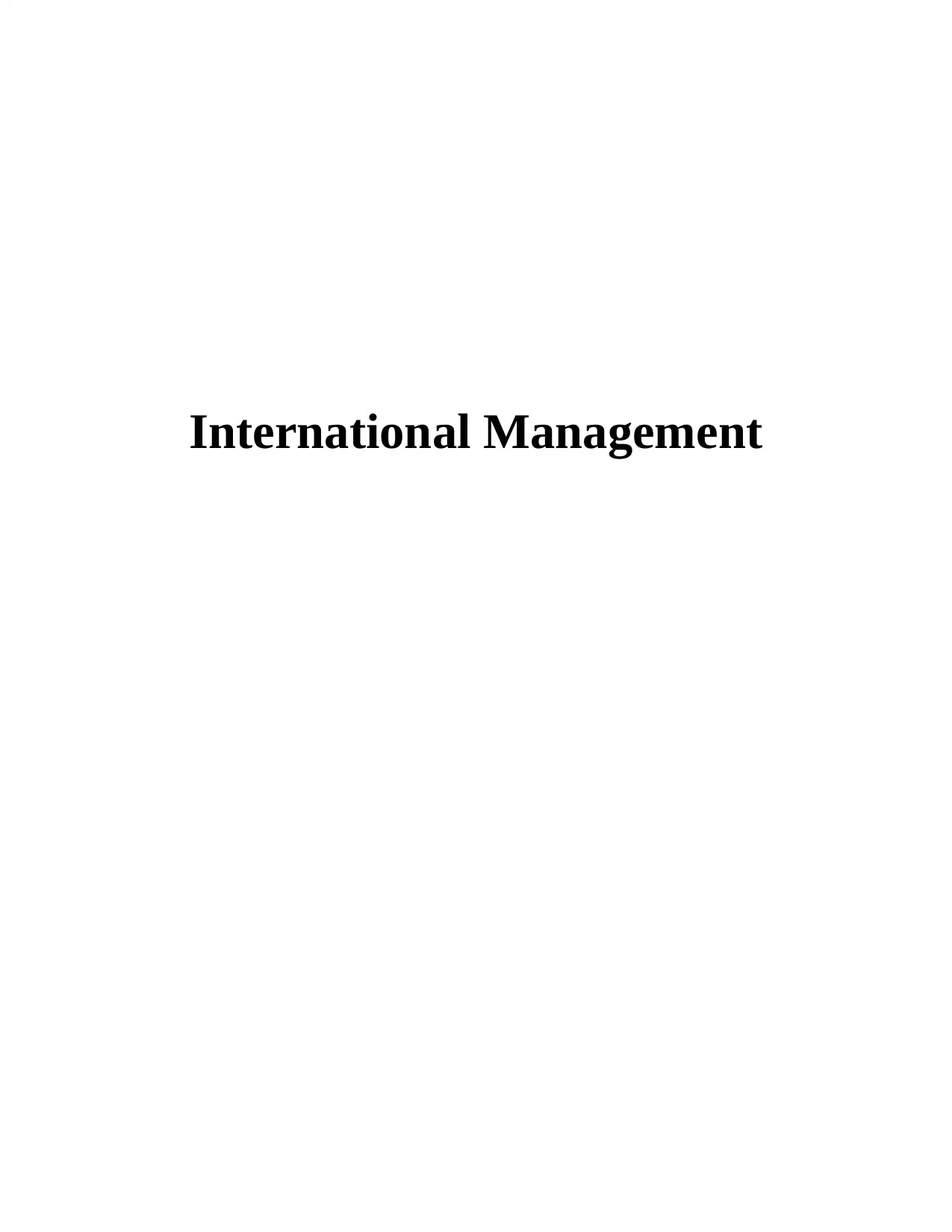
International Management
Paraphrase This Document
Need a fresh take? Get an instant paraphrase of this document with our AI Paraphraser

Table of Contents
TASK 2 CONCLUSION ................................................................................................................1
REFERENCES................................................................................................................................3
TASK 2 CONCLUSION ................................................................................................................1
REFERENCES................................................................................................................................3
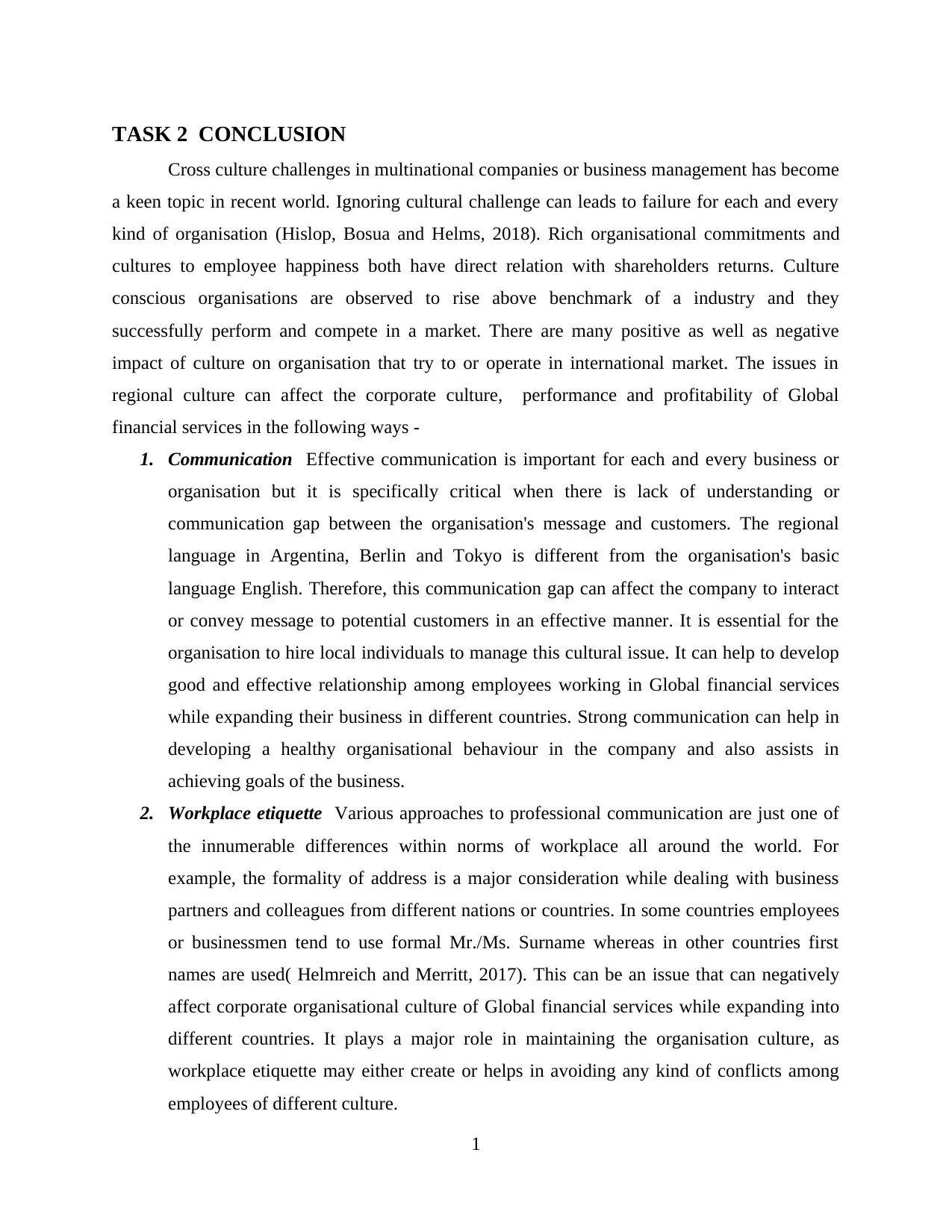
TASK 2 CONCLUSION
Cross culture challenges in multinational companies or business management has become
a keen topic in recent world. Ignoring cultural challenge can leads to failure for each and every
kind of organisation (Hislop, Bosua and Helms, 2018). Rich organisational commitments and
cultures to employee happiness both have direct relation with shareholders returns. Culture
conscious organisations are observed to rise above benchmark of a industry and they
successfully perform and compete in a market. There are many positive as well as negative
impact of culture on organisation that try to or operate in international market. The issues in
regional culture can affect the corporate culture, performance and profitability of Global
financial services in the following ways -
1. Communication Effective communication is important for each and every business or
organisation but it is specifically critical when there is lack of understanding or
communication gap between the organisation's message and customers. The regional
language in Argentina, Berlin and Tokyo is different from the organisation's basic
language English. Therefore, this communication gap can affect the company to interact
or convey message to potential customers in an effective manner. It is essential for the
organisation to hire local individuals to manage this cultural issue. It can help to develop
good and effective relationship among employees working in Global financial services
while expanding their business in different countries. Strong communication can help in
developing a healthy organisational behaviour in the company and also assists in
achieving goals of the business.
2. Workplace etiquette Various approaches to professional communication are just one of
the innumerable differences within norms of workplace all around the world. For
example, the formality of address is a major consideration while dealing with business
partners and colleagues from different nations or countries. In some countries employees
or businessmen tend to use formal Mr./Ms. Surname whereas in other countries first
names are used( Helmreich and Merritt, 2017). This can be an issue that can negatively
affect corporate organisational culture of Global financial services while expanding into
different countries. It plays a major role in maintaining the organisation culture, as
workplace etiquette may either create or helps in avoiding any kind of conflicts among
employees of different culture.
1
Cross culture challenges in multinational companies or business management has become
a keen topic in recent world. Ignoring cultural challenge can leads to failure for each and every
kind of organisation (Hislop, Bosua and Helms, 2018). Rich organisational commitments and
cultures to employee happiness both have direct relation with shareholders returns. Culture
conscious organisations are observed to rise above benchmark of a industry and they
successfully perform and compete in a market. There are many positive as well as negative
impact of culture on organisation that try to or operate in international market. The issues in
regional culture can affect the corporate culture, performance and profitability of Global
financial services in the following ways -
1. Communication Effective communication is important for each and every business or
organisation but it is specifically critical when there is lack of understanding or
communication gap between the organisation's message and customers. The regional
language in Argentina, Berlin and Tokyo is different from the organisation's basic
language English. Therefore, this communication gap can affect the company to interact
or convey message to potential customers in an effective manner. It is essential for the
organisation to hire local individuals to manage this cultural issue. It can help to develop
good and effective relationship among employees working in Global financial services
while expanding their business in different countries. Strong communication can help in
developing a healthy organisational behaviour in the company and also assists in
achieving goals of the business.
2. Workplace etiquette Various approaches to professional communication are just one of
the innumerable differences within norms of workplace all around the world. For
example, the formality of address is a major consideration while dealing with business
partners and colleagues from different nations or countries. In some countries employees
or businessmen tend to use formal Mr./Ms. Surname whereas in other countries first
names are used( Helmreich and Merritt, 2017). This can be an issue that can negatively
affect corporate organisational culture of Global financial services while expanding into
different countries. It plays a major role in maintaining the organisation culture, as
workplace etiquette may either create or helps in avoiding any kind of conflicts among
employees of different culture.
1
⊘ This is a preview!⊘
Do you want full access?
Subscribe today to unlock all pages.

Trusted by 1+ million students worldwide
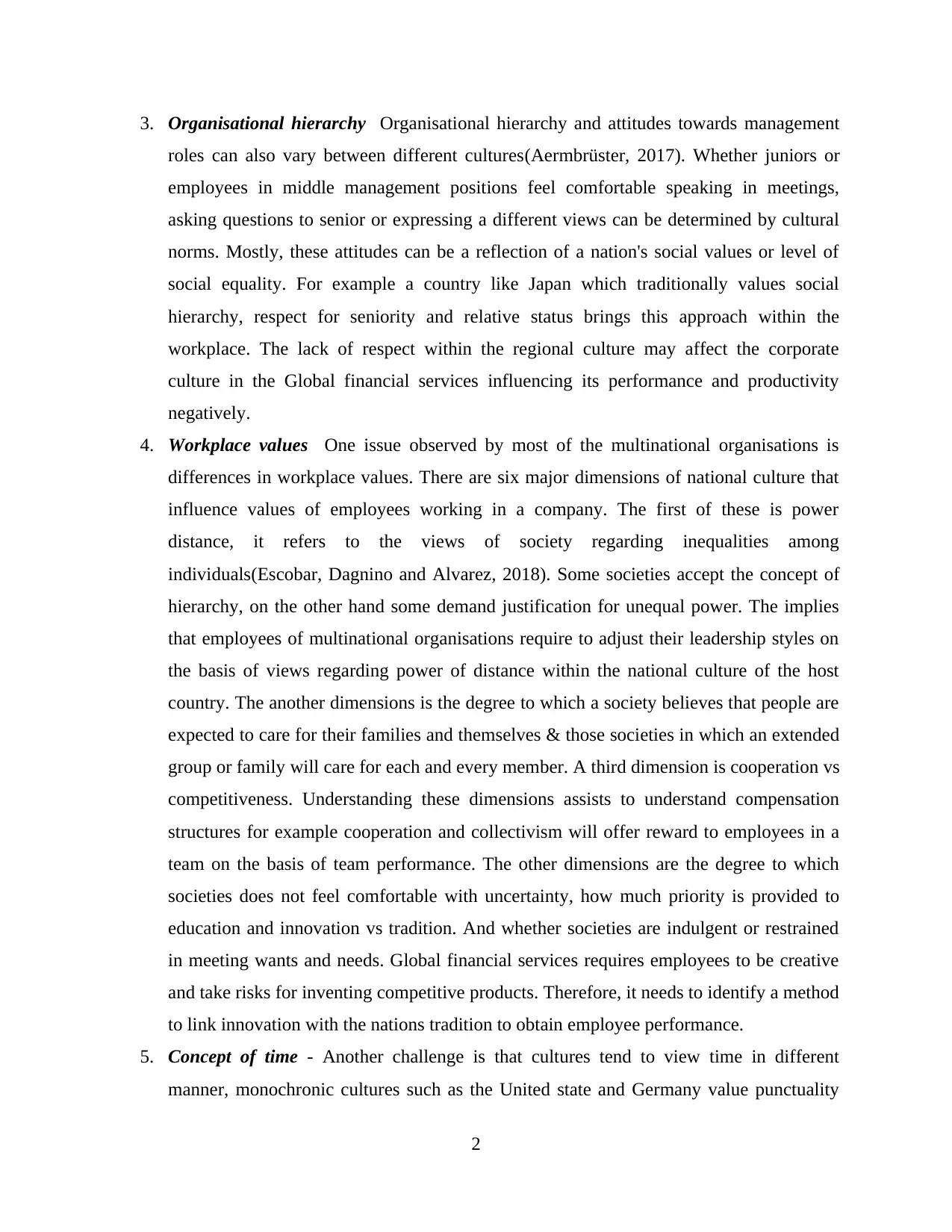
3. Organisational hierarchy Organisational hierarchy and attitudes towards management
roles can also vary between different cultures(Aermbrüster, 2017). Whether juniors or
employees in middle management positions feel comfortable speaking in meetings,
asking questions to senior or expressing a different views can be determined by cultural
norms. Mostly, these attitudes can be a reflection of a nation's social values or level of
social equality. For example a country like Japan which traditionally values social
hierarchy, respect for seniority and relative status brings this approach within the
workplace. The lack of respect within the regional culture may affect the corporate
culture in the Global financial services influencing its performance and productivity
negatively.
4. Workplace values One issue observed by most of the multinational organisations is
differences in workplace values. There are six major dimensions of national culture that
influence values of employees working in a company. The first of these is power
distance, it refers to the views of society regarding inequalities among
individuals(Escobar, Dagnino and Alvarez, 2018). Some societies accept the concept of
hierarchy, on the other hand some demand justification for unequal power. The implies
that employees of multinational organisations require to adjust their leadership styles on
the basis of views regarding power of distance within the national culture of the host
country. The another dimensions is the degree to which a society believes that people are
expected to care for their families and themselves & those societies in which an extended
group or family will care for each and every member. A third dimension is cooperation vs
competitiveness. Understanding these dimensions assists to understand compensation
structures for example cooperation and collectivism will offer reward to employees in a
team on the basis of team performance. The other dimensions are the degree to which
societies does not feel comfortable with uncertainty, how much priority is provided to
education and innovation vs tradition. And whether societies are indulgent or restrained
in meeting wants and needs. Global financial services requires employees to be creative
and take risks for inventing competitive products. Therefore, it needs to identify a method
to link innovation with the nations tradition to obtain employee performance.
5. Concept of time - Another challenge is that cultures tend to view time in different
manner, monochronic cultures such as the United state and Germany value punctuality
2
roles can also vary between different cultures(Aermbrüster, 2017). Whether juniors or
employees in middle management positions feel comfortable speaking in meetings,
asking questions to senior or expressing a different views can be determined by cultural
norms. Mostly, these attitudes can be a reflection of a nation's social values or level of
social equality. For example a country like Japan which traditionally values social
hierarchy, respect for seniority and relative status brings this approach within the
workplace. The lack of respect within the regional culture may affect the corporate
culture in the Global financial services influencing its performance and productivity
negatively.
4. Workplace values One issue observed by most of the multinational organisations is
differences in workplace values. There are six major dimensions of national culture that
influence values of employees working in a company. The first of these is power
distance, it refers to the views of society regarding inequalities among
individuals(Escobar, Dagnino and Alvarez, 2018). Some societies accept the concept of
hierarchy, on the other hand some demand justification for unequal power. The implies
that employees of multinational organisations require to adjust their leadership styles on
the basis of views regarding power of distance within the national culture of the host
country. The another dimensions is the degree to which a society believes that people are
expected to care for their families and themselves & those societies in which an extended
group or family will care for each and every member. A third dimension is cooperation vs
competitiveness. Understanding these dimensions assists to understand compensation
structures for example cooperation and collectivism will offer reward to employees in a
team on the basis of team performance. The other dimensions are the degree to which
societies does not feel comfortable with uncertainty, how much priority is provided to
education and innovation vs tradition. And whether societies are indulgent or restrained
in meeting wants and needs. Global financial services requires employees to be creative
and take risks for inventing competitive products. Therefore, it needs to identify a method
to link innovation with the nations tradition to obtain employee performance.
5. Concept of time - Another challenge is that cultures tend to view time in different
manner, monochronic cultures such as the United state and Germany value punctuality
2
Paraphrase This Document
Need a fresh take? Get an instant paraphrase of this document with our AI Paraphraser
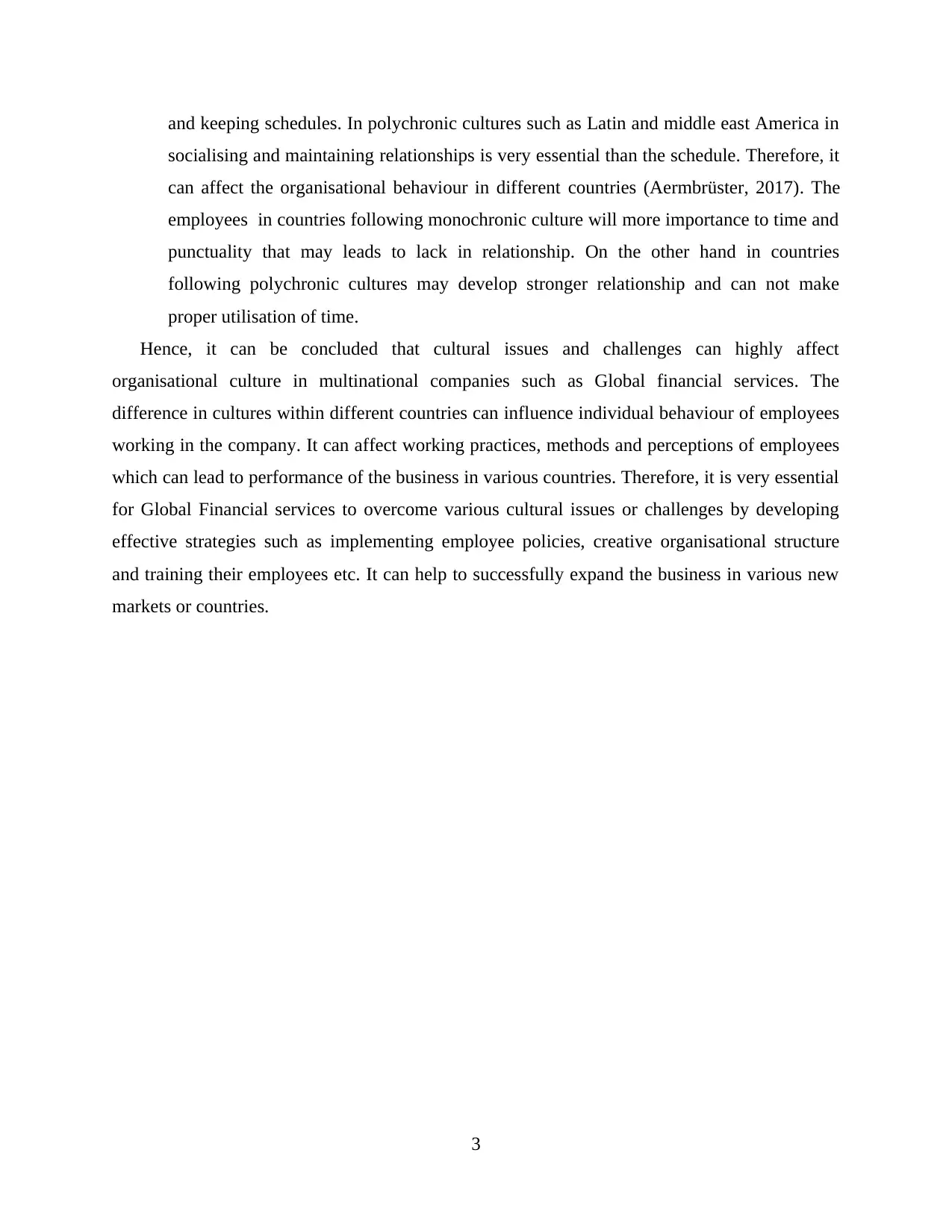
and keeping schedules. In polychronic cultures such as Latin and middle east America in
socialising and maintaining relationships is very essential than the schedule. Therefore, it
can affect the organisational behaviour in different countries (Aermbrüster, 2017). The
employees in countries following monochronic culture will more importance to time and
punctuality that may leads to lack in relationship. On the other hand in countries
following polychronic cultures may develop stronger relationship and can not make
proper utilisation of time.
Hence, it can be concluded that cultural issues and challenges can highly affect
organisational culture in multinational companies such as Global financial services. The
difference in cultures within different countries can influence individual behaviour of employees
working in the company. It can affect working practices, methods and perceptions of employees
which can lead to performance of the business in various countries. Therefore, it is very essential
for Global Financial services to overcome various cultural issues or challenges by developing
effective strategies such as implementing employee policies, creative organisational structure
and training their employees etc. It can help to successfully expand the business in various new
markets or countries.
3
socialising and maintaining relationships is very essential than the schedule. Therefore, it
can affect the organisational behaviour in different countries (Aermbrüster, 2017). The
employees in countries following monochronic culture will more importance to time and
punctuality that may leads to lack in relationship. On the other hand in countries
following polychronic cultures may develop stronger relationship and can not make
proper utilisation of time.
Hence, it can be concluded that cultural issues and challenges can highly affect
organisational culture in multinational companies such as Global financial services. The
difference in cultures within different countries can influence individual behaviour of employees
working in the company. It can affect working practices, methods and perceptions of employees
which can lead to performance of the business in various countries. Therefore, it is very essential
for Global Financial services to overcome various cultural issues or challenges by developing
effective strategies such as implementing employee policies, creative organisational structure
and training their employees etc. It can help to successfully expand the business in various new
markets or countries.
3
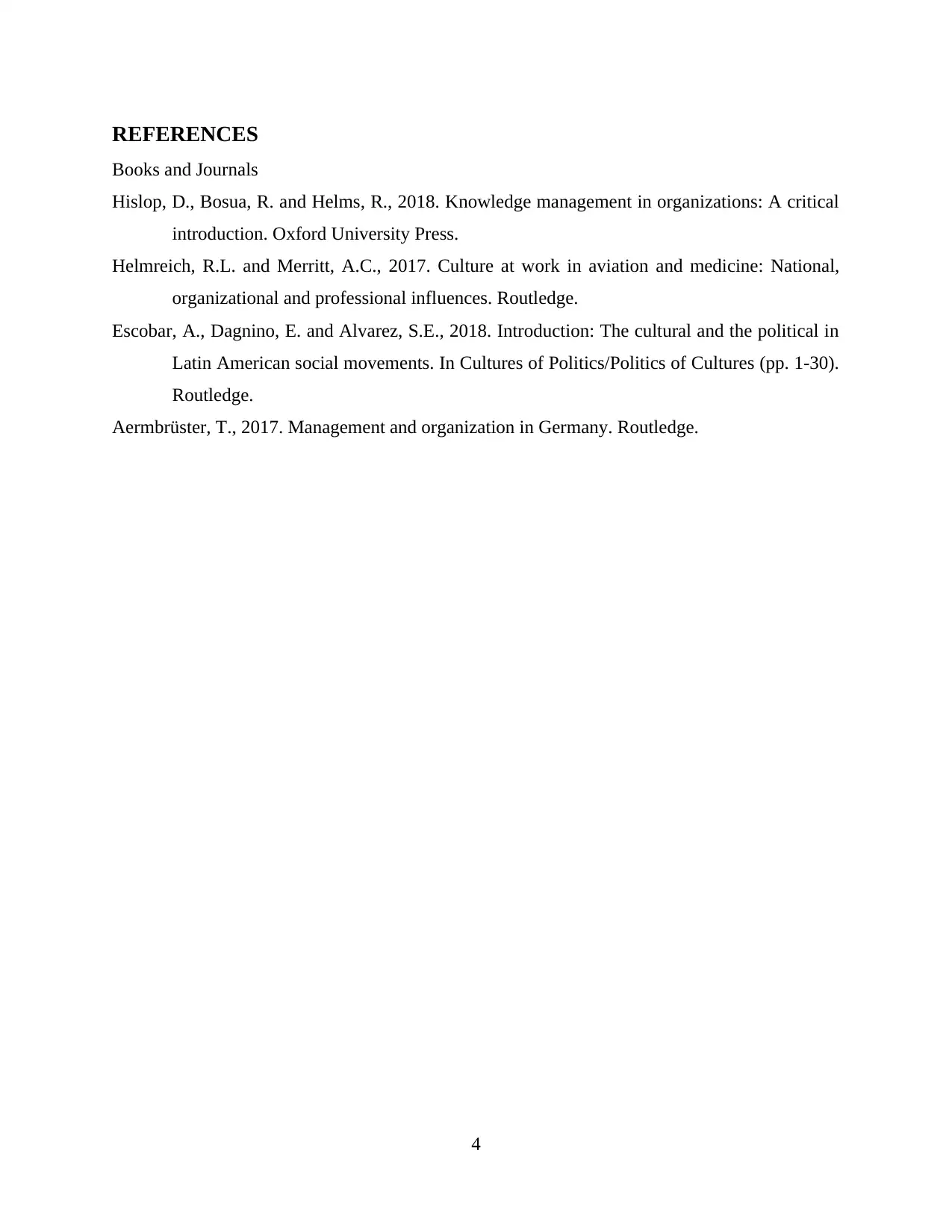
REFERENCES
Books and Journals
Hislop, D., Bosua, R. and Helms, R., 2018. Knowledge management in organizations: A critical
introduction. Oxford University Press.
Helmreich, R.L. and Merritt, A.C., 2017. Culture at work in aviation and medicine: National,
organizational and professional influences. Routledge.
Escobar, A., Dagnino, E. and Alvarez, S.E., 2018. Introduction: The cultural and the political in
Latin American social movements. In Cultures of Politics/Politics of Cultures (pp. 1-30).
Routledge.
Aermbrüster, T., 2017. Management and organization in Germany. Routledge.
4
Books and Journals
Hislop, D., Bosua, R. and Helms, R., 2018. Knowledge management in organizations: A critical
introduction. Oxford University Press.
Helmreich, R.L. and Merritt, A.C., 2017. Culture at work in aviation and medicine: National,
organizational and professional influences. Routledge.
Escobar, A., Dagnino, E. and Alvarez, S.E., 2018. Introduction: The cultural and the political in
Latin American social movements. In Cultures of Politics/Politics of Cultures (pp. 1-30).
Routledge.
Aermbrüster, T., 2017. Management and organization in Germany. Routledge.
4
⊘ This is a preview!⊘
Do you want full access?
Subscribe today to unlock all pages.

Trusted by 1+ million students worldwide
1 out of 6
Related Documents
Your All-in-One AI-Powered Toolkit for Academic Success.
+13062052269
info@desklib.com
Available 24*7 on WhatsApp / Email
![[object Object]](/_next/static/media/star-bottom.7253800d.svg)
Unlock your academic potential
Copyright © 2020–2025 A2Z Services. All Rights Reserved. Developed and managed by ZUCOL.



